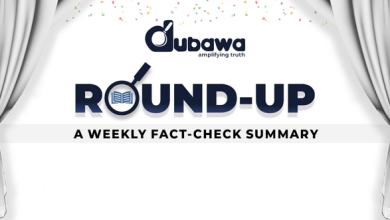
Claim: Videos circulating in local languages on TikTok suggest that users will get financial rewards if they click on advertised links.

Verdict: Misleading! The videos are AI-generated, and clicking on the links could expose unsuspecting users to phishing attacks.
Full Text
The economic situation in Nigeria has exposed citizens to numerous fraudulent schemes. Young Nigerians are now seeking online jobs that promise enticing rewards and seemingly simple tasks.
While there may be legitimate online jobs that require specific skills and work hours, fake job advertisements have often overshadowed genuine ones on social platforms.
Amid the stark reality of many struggling households in Nigeria, a report from Business Day in April 2025 revealed that less than 1% of Nigerians earn N1 million per month.
The development has continued to elicit concerns among stakeholders, while some are capitalising on the situation to defraud unsuspecting Nigerians.
Recently, some videos flooded TikTok urging users to click on an ‘Apply Now” button. Interestingly, the subject in the video, obviously an animated character, was heard speaking to the audience in a local language. This is intended to strengthen further the conviction that the transaction is legal.
In the first week of September, DUBAWA came across some videos in Yoruba and Hausa languages, promising to assist users with a small amount of money they can use to respond to the needs of their respective families, only if they clicked on a particular link.

Also, an animated video bore the semblance of an advert by a popular bank in Nigeria, claiming the bank has a scheme in place to assist Nigerians get easy access to a loan if they clicked on an apply now button, where they fill in personal details such as their names, account number, and bank name.

DUBAWA observed that the majority of users who commented on these posts shared their account details in the comment section, hoping to access the help promised by the accounts.

Due to the nature of this claim, which poses a risk of exposing users to phishing attacks, DUBAWA decided to investigate the claim.
Verification
DUBAWA observed that most of the videos were sponsored, and some of them did not appear on the TikTok profile. This could be that the user enabled the “Don’t show on TikTok profile” option in Ads Manager.
When we clicked on one of the links labeled ‘Apply Now,’ it directed us to a page requesting the user’s details, including their gender. Another link popped up a page that asked if the user was willing to chat with foreigners and earn money.

We clicked on any of the available options to proceed to the next page; instead, it directed us to a website detailing how one can acquire a work visa for Canada, the United Kingdom, Germany, and other countries. Other pages requested personal information from users, including their names and bank details, and supplying such information could expose unsuspecting job/palliative seekers to phishing attacks.

On some of these blog pages, other attractive adverts asking if one is willing to earn money pop up, but when we click on them, they lead to a blank page.
DUBAWA analyzed the videos with AIorNot and Deepfake-o-meter to ascertain the authenticity of the documents, and they were confirmed to be AI-generated. In one of the videos, a VEO watermark appeared at the bottom-right corner, indicating that the video was created using VEO, an AI video generation tool.
Also, from the speech to the mannerisms of the characters on screen, it was obvious that the videos had been generated using AI tools.

Conclusion
The videos created in Yoruba and Hausa, which promise to reward users with money, are misleading as they redirect users to other websites.
 Nigerians, International groups react to DUBAWA’s surrogacy report, call for ban
Nigerians, International groups react to DUBAWA’s surrogacy report, call for ban Old video recirculated to portray Olubadan endorsing Peter Obi
Old video recirculated to portray Olubadan endorsing Peter Obi Round-Up: Top five claims we fact-checked this week
Round-Up: Top five claims we fact-checked this week Would adding lemon, sugar to sanitary pads prevent infection?
Would adding lemon, sugar to sanitary pads prevent infection?